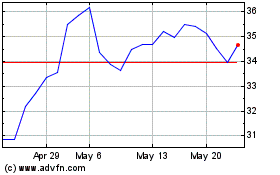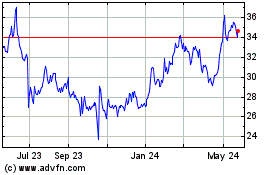2nd UPDATE: Ranbaxy Settles FDA Issues; Sets Aside $500 Million For Another US Case
December 21 2011 - 3:50AM
Dow Jones News
Ranbaxy Laboratories Ltd. (500359.BY) has resolved all quality
issues with the U.S. health regulator, the Indian company confirmed
Wednesday, adding however that it will set aside $500 million to
settle any liabilities arising from a separate dispute with the
U.S. Justice Department.
News of the provision hurt not just Ranbaxy, but parent Daiichi
Sankyo Co. (4568.TO) as well, forcing Japan's third-biggest
pharmaceuticals company by market capitalization to nearly halve
its profit forecast for this fiscal year through March.
Daiichi Sankyo now expects a group net profit of Y26 billion,
compared with a previously projected Y50 billion. The revised
figure will be 63% lower than the Y70.12 billion profit Daiichi
Sankyo notched up in the past fiscal year.
As part of efforts to offset the $500 million (Y38 billion)
provision, Daiichi Sankyo announced pay cuts for executives for the
next six months: Its president and chairman will receive a 30% pay
reduction for six months while other board members' salaries will
be cut by 5%-10%.
Ranbaxy said the $500 million provision is meant to cover all
potential "civil and criminal liability" arising from a U.S.
Justice Department probe into whether it manufactured substandard
generic drugs.
Investors in Japan took the news in their stride--with Daiichi
Sankyo's stock recently up 2.4% at Y1,509 in Tokyo--because a
near-term U.S. settlement was anticipated.
But Ranbaxy's stock was punished in India because of what market
participants saw as a higher-than-expected settlement provision for
the Justice Department case.
At 0710 GMT, Ranbaxy shares were trading 1.3% lower at INR390.40
in a Bombay Stock Exchange market up 1.4%.
This despite the positives that follow Ranbaxy's settlement with
the U.S. Food and Drug Administration, which the drugmaker said
came after it committed to further strengthen procedures to ensure
data integrity and to comply with good manufacturing practices at
its plants.
It didn't say whether the FDA settlement included any financial
payments.
The settlement with the FDA, which is subject to approval by the
U.S. District Court in Maryland, comes after the regulator banned
the company in 2008 from importing more than 30 of its generic
drugs because of alleged violations of manufacturing practices at
its plants at Dewas and Paonta Sahib in India.
The ban was imposed just months after Daiichi Sankyo acquired a
stake of more than 50% in Ranbaxy for $4.6 billion.
The FDA also halted reviews of drug applications from Paonta
Sahib in 2009, alleging that Ranbaxy falsified data.
The FDA ban had significantly impacted Ranbaxy's sales growth
and profitability over the past two years.
The settlement, which came with a "consent decree," could lead
to the FDA reopening reviews of applications for exports to the
U.S. of drugs manufactured at Paonta Sahib.
It wasn't immediately clear by when Ranbaxy will be allowed to
restart selling drugs manufactured at the two plants, but the
settlement and the provision "bring greater predictability to
Ranbaxy's U.S. operations," said Arun Sawhney, Ranbaxy chief
executive and managing director.
A consent decree is a settlement of a lawsuit or criminal case
in which a person or company agrees to take specific actions
without admitting fault or guilt for the situation that led to the
lawsuit.
Bino Pathiparampil, vice president at brokerage IIFL Capital,
said that, although there is a consent decree now, "it is going to
take at least more than a year [it takes time for the company to
implement the corrective measures laid out in the consent decree]
before we can see some product approvals."
The approvals may come only in small batches and may not be for
the entire facility, he added.
The FDA settlement now leaves the legal dispute with the U.S.
Justice Department as the last major impediment to Ranbaxy's
efforts to boost sales growth in the largest drug market in the
world.
The settlement comes close on the heels of Ranbaxy breaking new
ground by launching the much-awaited copycat of the world's
largest-selling drug--Pfizer Inc.'s Lipitor cholesterol-lowering
drug. Ranbaxy was awarded sales exclusivity under U.S. federal law
as it was the first successful generic challenger to Lipitor.
"...with this resolution in the United States, it will allow
Daiichi Sankyo to expand worldwide sales of its new drugs using the
Ranbaxy network," said Satoru Takaoki, a pharmaceutical analyst at
Tokyo-based SMBC Friend Research Center.
--By Dhanya Ann Thoppil, Dow Jones Newswires; +91-9886929464; dhanya.thoppil@dowjones.com
Daiichi Sankyo (PK) (USOTC:DSNKY)
Historical Stock Chart
From Dec 2024 to Jan 2025

Daiichi Sankyo (PK) (USOTC:DSNKY)
Historical Stock Chart
From Jan 2024 to Jan 2025
